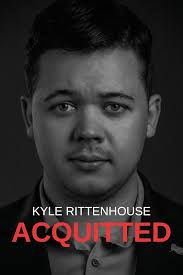Book Summary
Acquitted is Kyle Rittenhouse’s firsthand account of the 2020 Kenosha shootings, his highly publicized trial, and the aftermath. The memoir details his perspective as a teenager thrust into a national debate about self-defense, gun rights, and political polarization. Rittenhouse recounts the chaotic night that left two dead and one injured, framing his actions as self-preservation amid civil unrest. His narrative oscillates between courtroom drama, personal reflections, and criticism of media coverage.
The book leaves readers with an unfiltered look at Rittenhouse’s emotional journey—from the trauma of the event to the relief of his acquittal. While some may disagree with his portrayal, the memoir undeniably captures the complexities of a case that divided America. The writing is direct, occasionally repetitive, but charged with the urgency of someone defending their life’s narrative.
Key Themes
Self-Defense vs. Vigilantism: Rittenhouse rigorously defends his stance that he acted purely in self-defense, citing video evidence and witness testimonies. The book dissects legal nuances like “reasonable fear” and the burden of proof, offering a primer on self-defense laws. Critics may argue the narrative downplays the broader context of armed civilians in protest zones, but the theme dominates the memoir’s core argument.
Media and Public Perception: Nearly a third of the book critiques media portrayals, accusing outlets of distorting facts to fit ideological narratives. Rittenhouse shares screenshots of headlines and social media posts, contrasting them with trial evidence. This theme resonates with readers skeptical of mainstream media, though some may wish for deeper analysis of why such narratives gained traction.
What Makes It Unique
Unfiltered Defendant Perspective: Unlike true crime accounts written by journalists, Acquitted provides rare insight into a defendant’s psyche during a landmark trial. Rittenhouse describes panic attacks before testimony, clashes with legal teams, and the surreal experience of becoming a political symbol. These raw moments distinguish it from detached third-party reporting.
Hybrid Memoir-Legal Analysis: The book alternates between personal storytelling and granular breakdowns of trial strategy. Rittenhouse explains why his team objected to certain jury instructions or how a prosecutor’s misstep became pivotal. This blend humanizes the legal process while educating readers on courtroom tactics—a balance few memoirs achieve.
Reader Reactions
Reviews polarize sharply, mirroring the trial’s divisiveness. Supporters praise its transparency: Finally hearing Kyle’s side without media filters changed my view entirely,
writes one Amazon reviewer. Others critique its tone: He acknowledges the tragedy but still frames himself as the ultimate victim,
notes a Goodreads comment. The book has unusually high ratings on conservative-leaning platforms (4.8/5 on DWAC Books) versus middling scores elsewhere (3.2/5 on Barnes & Noble).
Many readers highlight the chaos of that night
descriptions as the book’s strongest element, though some wish Rittenhouse had more deeply examined his decision to bring a rifle to the protests. A recurring debate in reviews centers on whether the memoir fosters accountability or furthers ideological divides.
About the Author
Kyle Rittenhouse became a household name after his 2021 acquittal on homicide charges related to the Kenosha unrest. Now an activist and public speaker, he advocates for self-defense rights and criticizes what he calls media malpractice.
Before the shootings, he was an Illinois lifeguard with aspirations of nursing school—a contrast to his later portrayal as either a vigilante or patriot.
This memoir marks Rittenhouse’s most comprehensive effort to control his own narrative. His proximity to the events grants authenticity but also limits introspection; at times, the writing reflects the perspective of a young man still processing trauma rather than a seasoned author. Nonetheless, his insider view of a legal and media whirlwind makes this a unique primary source.
Memorable Quotes
The moment I heard ‘not guilty,’ I didn’t feel victory—just exhaustion. Twelve strangers saw the truth, but millions had already condemned me.
They wanted me to be a symbol. I just wanted to go home.
